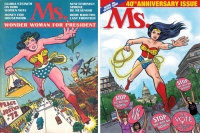 I recently went to see Zack Snyder’s Man of Steel. I saw it two times actually. Readers familiar with my posts about cosplay and video gaming will not be surprised to learn that I am also a fan of comic book heroes and heroines; and Superman was my childhood favorite.
I recently went to see Zack Snyder’s Man of Steel. I saw it two times actually. Readers familiar with my posts about cosplay and video gaming will not be surprised to learn that I am also a fan of comic book heroes and heroines; and Superman was my childhood favorite.
I was both attracted to and wanted to be like Superman, specifically, Christopher

Reeves’ Superman. One of my strongest childhood desires was also to fly like a bird. I remember jumping off the end of my parent’s bed over and over again, convinced that if I flapped hard enough and kept on trying that I could fly. The older I got, the more I realized that I also did not want to be “rescued” by Superman. Rescue from the difficulties in my life was an unattainable fantasy. So, I desperately wanted to be Superman. Though I knew this too was impossible, perhaps I had only to try.
Superheroes and superheroines[1] often embody powers that give them more control than your average human. Some (though definitely not all) of these powers have exclusively violent applications, and the characters who use them can tend to reinforce dualistic notions of good vs. evil. Superheroes in particular are often mired in patriarchal religious narratives and symbols, a relationship that Man of Steel makes fairly explicit. When Henry Cavill’s Superman walks into a church to ask a priest if he should surrender himself to General Zod to save all of humanity, a strategic camera shot focuses on his face, framed, or perhaps hallo-ed, by the image of Jesus Christ in a stained glass window behind him.

One can perhaps, easily imagine why a child, like myself, raised within the paradigm of racist, heterosexist, capitalist patriarchy, might aspire to harness these god-like powers: I often felt powerless. However, I was also an extremely feminine young girl. Why not aspire to be like a Superheroine, like Supergirl? Simply put: I did not want to be Supergirl. She was a weaker and less interesting version of Superman.

My child-self had bought into the lie that power was more appropriately found in male bodies. While comic book superheroines do, in some cases, harness deified powers equivalent to their male companions, they are also subject to the same sexism as their female fans. Their goddess-like power is tempered for a male dominated culture.
I recently listened to a fascinating book by Mike Madrid called, The Supergirls: Fashion, feminism, fantasy and the history of comic book heroines. Madrid explains the evolution of comic book heroines, their appearance and their power as these relate to popular culture, the growth of feminism and fashion trends throughout the 20-21st centuries. The stories he recounts are sometimes very sad and angering: female heroes die, their comics are discontinued or their powers stripped because a dominant male readership is uncomfortable with women showing too much power.

Heroines are “girls,” not women, because this is less threatening and suggests paternal control. Supergirl can have powers like Superman, as long as she is obedient to Superman. (Madrid, 2009). In fact, Madrid points out that rather than singlehandedly saving the world like their male counter-parts, ultra powerful superheroines often become corrupt and threaten the world. Like X-men’s Dark Phoenix, these heroines are slain or restrained supposedly, ‘for the good of us all’ (Madrid, 2009). Patriarchy must, after all, continue to slay the goddess in the myths of HIStory, so to secure her repression (Keller, From a Broken Web, 1986).
Yet, Madrid also argues that “The Supergirls” are subversive, and as culture changes so do they. Furthermore, their narratives are becoming stronger. The Supergirls find ways to use their powers despite resistance and cultural gender norms. Some comic book authors wrote with specifically feminist or female empowerment goals in mind. Other authors worked to change the comic industry by showing how a female hero’s perspective might change the heroine’s relationship to newly discovered abilities. (Madrid, 2009).
One heroine in particular is an icon that represents work across decades to maintain a female presence in the world of comic book heroes. Madrid talks about her in almost every chapter. Daughter of an Amazonian Queen and imbued with the power of goddesses, her name is Wonder Woman.
So… you may have noticed a recent trend of Superhero movies at the box office. Man of Steel is one of a string of DC Comics Superhero movies that is supposed to culminate in a highly anticipated Justice League movie.[2] Well, here’s the thing. There is no Justice League without Wonder Woman. And Wonder Woman, unlike many of her super-sisters, stands on her own without a Super-team to back her up, nor a paternal benefactor to whom she owes her name. Actually, she stood on her own on the cover of Ms. Magazine with the caption “Wonder Woman for President,” in 1972, and again, in 2012, running behind protestors who hold signs that read, “Stop the War on Women.”
Wonder Woman cannot burn holes in walls with her eyes. She does not even get to keep her super-human strength, as this power is taken from her in certain incarnations. One power, however, remains distinctively Wonder Woman: her golden Lasso of Truth, which requires people to tell the truth. I like that superpower—it is a power unlike the powers of those gods and goddesses in the rest of the Comic book pantheon. It is a power we can share.
Less than a week after my second viewing of Man of Steel, I saw real life women use such power. Texas Senator, Wendy Davis stood for 13 hours to filibuster Senate Bill 5, which attempted to close all but 5 of the state’s abortion providing clinics. Davis’ filibuster generated a force that required Republican Senators to tell the truth when they tried to cover up Davis’ success. The protest was powerful and inspiring, and beautifully feminist. I watched a Daily Show review of Davis’ filibuster a couple of days later, during which the producers showed a clip of the Senator’s epic speech under the caption, “Woman of Steel.” I nearly cried. She was not Superman. She and her supporters were Wonder Woman.

I do not know if DC will actually make a Wonder Woman movie (the project has stalled many times), but they should. The Justice League is incomplete without her. I hope that we can finally celebrate a goddess in this genre.
As a feminist and an ally to other civil rights workers, I cannot uncritically enjoy comic book heroines and heroes. Yet, I remain a fan of comic book characters because these super-men and super-women challenge the societies in which they live, and even, the kinds of powers they embody. Superheroines and superheroes often struggle with what it means to be human within hyperboles of the abilities we already have. Responsible fandom requires me to be aware and critical of the kinds of super powers society celebrates, and to ask, whom we allow to have these powers. But, as I continue to reclaim my own female embodiment of power, I am also learning to identify other people’s super powers and to celebrate the goddesses surfacing around me.
So, what’s your superpower? And who is allowed to have it?
[1] By the way, I had to add the word “superheroine,” but not “superhero,” to my word processing dictionary.
[2] The Justice League is DC’s superhero club, akin to Marvel’s Avengers. Just to give you a sense of the potential draw of a Justice League movie: the 2012 Avengers movie grossed $207,438,708 on opening weekend and $1,514,357,910 worldwide according to boxoffice.com.
Sara Frykenberg, Ph.D.: Graduate of the women studies in religion program at Claremont Graduate University, Sara’s research considers the way in which process feminist theo/alogies reveal a kind transitory violence present in the liminal space between abusive paradigms and new non-abusive creations: a counter-necessary violence. In addition to her feminist, theo/alogical and pedagogical pursuits, Sara is also an avid fan of science fiction and fantasy literature, and a level one Kundalini yoga teacher.


Sara – wow!! I was the same as a child. I really, really thought I could fly. I jumped off everything, including some very high brick walls , always with a cape of some kind. I tried for so long to fly. I also thought I could walk on water – 2 steps is as far as I got. I wasn’t a super hero though – I was a fairy, tinkerbell or just you standard garden variety. I laughed when I read your post, lovely memories it brought back, thankyou x
LikeLike
Thanks Jassy!
I love that you did this too! I really appreciate that you wanted to walk on water as well. :)
In addition to jumping off my parent’s bed, I also used to be sure, when trampolining, that I was floating in the air between jumps longer than gravity should allow ;)
LikeLike
Thought provoking piece. However, I do feel that Wonder Woman is just a token female and fails to compete with other superheroes in terms of appeal. The television series was just cringeable and I would not go to the cinema to watch a film about her. I agree that the heroes reflect the patriarchal society – white society at that. The changes will continue but will be minor because women are the ones who have children and, in many cases, their careers alter because of it. The majority of leaders will still be men. So again the female superheroes will reflect the minor changes and will never reach the heights of Superman. A film I have seen twice also.
LikeLike
You are right that Wonder Woman does not have the same appeal. And I agree with you, the superhero genre is also dominated by white society (Eurocentric and sexist standards of beauty also permeate a great deal of Anime).
I disagree, however, that Wonder Woman is a “token,” partially because of the great effort so many people have taken to make sure that her female presence remains. Women and men had to fight to keep her in; and to me, that means a lot. She has a long history… (more than a TV show) including, as Mike Madrid’s book recounts, a creator interestingly enough, that actually made this character because he felt women were superior, and that superheroes needed to reflect this message.
I do not feel there are enough Women in comics– but I think it is also important that we do not use the word “token” uncritically because it is often used as a pejorative, and can minimize the “token” character in question more than the genre, movie, show, etc. that would exclude characters in racist, sexists or heterosexist ways..
LikeLike
I am not a reader of the comics so I accept your points regarding my belief that Wonder Woman is a mere token. My only knowledge of her is from the TV series in the 80s, which I thought was dreadful. The only comments I ever heard were about her skimpy costume and big hair.
LikeLike
So nice to read :-) Keep writing.
LikeLike
Thank you! :)
LikeLike
I have zero interest in superheroes and explosions and beating people up, but I like Wonder Woman a lot because she’s relatively nonviolent. BTW, instead of “superheroine,” try “superhera.” That “-ine” ending on “heroine” is, like “-ess” (“poetess”) and “-trix” (“aviatrix”), a feminine ending that diminishes the masculine word. A poetess is less than a “real” poet. Hera was a great goddess before Zeus invaded Greece and forced her into marriage. She also gave her name to her son Heracles (Latin, Hercules), one of the first superheroes. We can all be heras and maybe a few of us–like Wendy Davis and her female colleagues in that patriarchal heaven called Texas–can be superheras.
LikeLike
Thank you for the suggestion Barbara. I like that: superhera. I particularly like that in relationship to Wonder Woman, as she is imbued with powers from various Greek goddesses.
I also appreciate you sharing the link to other superheras! Drawing attention to the real-life existence of these women is definitely one of my goals.
LikeLike
Here are some real superheras. http://www.care2.com/causes/10-women-who-will-make-you-happy-about-america-again.html
LikeLike
Love this! We are so overdue for a woman-lead superhero movie but I am afraid of what they will do to her. The last attempt at a Wonder Woman tv series was horrible. “I’m a big time executive!” but 1)It’s a cosmetics company (really?) and 2) she goes home and eats ice cream in front of the tv alone (can we just stop with this scenario once and for all?). I want to see a Wonder Woman movie where she lives up to who she can be and inspire people just like Superman.
LikeLike
I LOVE your picture here Jennifer!! Fantastic and inspiring!! :)
I totally agree with you here. I really, really want to see a movie plot that would honor Wonder Woman’s unique kind of superhera-ness (thanks Barabara), and be as inspiring for fans as Superman– but the possibility they will try to make her more acceptable for a male dominated society is likely.
When I tried to research the possibility of this movie, I can’t tell you how many times I read the question “Are we ready for a Wonder Woman movie.” It made me sick and want to pull my hair out. I even read the comment: “She’s too feminist.” Wow.
… I will keep hoping though.
LikeLike
Well-done! I too relate to WOnder Woman and would like to see a movie with her.
LikeLike
Thank you!!!
LikeLike
What summed it up so succinctly: “…uncomfortable with women showing too much power.”
Why is that, we wonder? Is it threatening to their masculinity? Seems like the whole world would run a lot more smoothly if fellas wouldn’t be so hell-bent on creating ado and other difficulties under the guise of them running the show and just chill out already. One reason that the dynamic has remained this way for so long could be that women already know we are “Superheras” and thus, we don’t have to go around proving it all the time. Male society on the other hand throughout history seems to feel they still have to prove it…
I was not exposed to many of the comic book series and didn’t know about the X-Men until just over 10 years ago. I asked hubby, “Who’s this Jean Grey? What’s the big deal about her?” because, being exposed to mostly male figures of superheroes, I was used to seeing something obvious in the way of super powers. Hubby replied, with an almost reverent awe in his tone, “Only the most powerful of all the X-Men!”
The power of Woman is indeed so strong, so intense, so all-encompassing, that at some point long, long ago, it was hidden away and fallacies perpetuated in society throughout the ages to oppress it to the point of it being a great mystery. Perhaps it is the Holy Grail. Now, though, as we have begun chiseling away at its wrongful exile of a proverbial stone dungeon, as witnessed in the last century, we are discovering the truth in all its power and glory. We have made much progress, yet we still have much to do.
Our generation has been witness to this great awakening. It behooves us to break the chain of patriarchal rule and empower our daughters and granddaughters with the truth. It will not make life easier for them, but it will make them strong enough to stand up and fight the good fight, which is after all what a true Super does, be that hero or hera.
LikeLike
All of this — which I loved — reminded me of the Muriel Rukeyser quote: “What would happen if one woman told the truth about her life? The world would split open.” We are powerful. We are owning this power. And we are living out of it. Welcome to the new era of the divine feminine.
LikeLike